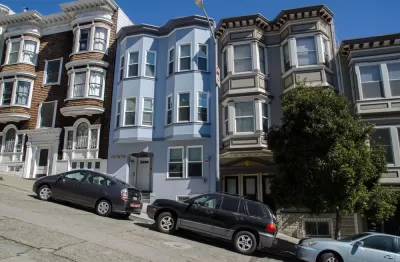Analysis and policy recommendations from Bay Area-based think tank SPUR focuses on how poorly designed inclusionary zoning the exact opposite of the desired effect.

"San Francisco is running out of funds to build affordable housing, and the city will need to make changes quickly to fix the problem," according to an article by Adhi Nagraj.
One question that must be asked in response to this reality: How did a city riding an economic boom get so short on funding to solve one of its most visible and morally troubling challenges? And another question: What can the city do about it?
To explain how the city got to this point, Nagraj has this to say: "Many factors are at play, but a look at data from the city indicates that a combination of rising construction costs and new requirements is slowing down new development and curtailing incoming funds from development fees.
And as for what to do about it, Nagraj shares five immediate suggestions endorsed by SPUR, including:
- Audit the building code to reduce costs.
- Support pre-fab construction outside of San Francisco.
- Set new inclusionary requirements.
- Allow more density bonuses.
- Pause increased inclusionary requirements.
The article includes a lot more detail on the how of San Francisco's funding shortage, as well as more detail on each of the five recommendations for what to do about it.
FULL STORY: How Has San Francisco Run Out of Money for Affordable Housing?

Planetizen Federal Action Tracker
A weekly monitor of how Trump’s orders and actions are impacting planners and planning in America.

Restaurant Patios Were a Pandemic Win — Why Were They so Hard to Keep?
Social distancing requirements and changes in travel patterns prompted cities to pilot new uses for street and sidewalk space. Then it got complicated.

Map: Where Senate Republicans Want to Sell Your Public Lands
For public land advocates, the Senate Republicans’ proposal to sell millions of acres of public land in the West is “the biggest fight of their careers.”

Maui's Vacation Rental Debate Turns Ugly
Verbal attacks, misinformation campaigns and fistfights plague a high-stakes debate to convert thousands of vacation rentals into long-term housing.

San Francisco Suspends Traffic Calming Amidst Record Deaths
Citing “a challenging fiscal landscape,” the city will cease the program on the heels of 42 traffic deaths, including 24 pedestrians.

California Homeless Arrests, Citations Spike After Ruling
An investigation reveals that anti-homeless actions increased up to 500% after Grants Pass v. Johnson — even in cities claiming no policy change.
Urban Design for Planners 1: Software Tools
This six-course series explores essential urban design concepts using open source software and equips planners with the tools they need to participate fully in the urban design process.
Planning for Universal Design
Learn the tools for implementing Universal Design in planning regulations.
Heyer Gruel & Associates PA
JM Goldson LLC
Custer County Colorado
City of Camden Redevelopment Agency
City of Astoria
Transportation Research & Education Center (TREC) at Portland State University
Camden Redevelopment Agency
City of Claremont
Municipality of Princeton (NJ)




























